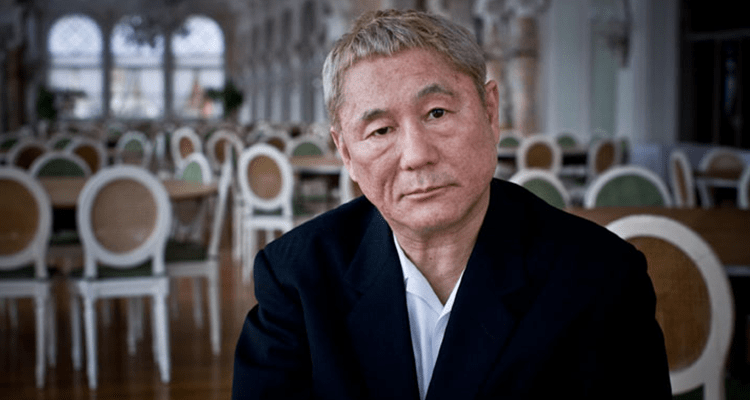Takeshi Kitano, born on January 18, 1947, in Tokyo, Japan, is a true polymath in the world of entertainment. Known for his exceptional skills as a filmmaker, actor, comedian, author, and painter, Kitano has made an indelible mark on the global cultural landscape. With his distinctive style, creativity, and versatility, he has garnered international acclaim, becoming a revered figure not only in Japanese cinema but also in the broader realm of artistic expression.

Early Life and Career Beginnings
Takeshi Kitano, often referred to as “Beat” Takeshi, grew up in Tokyo and exhibited an early interest in the arts. His journey into the world of entertainment began in the 1970s when he joined the comedy duo “Two Beat,” where he earned his nickname “Beat” Takeshi. Kitano’s wit, humor, and quick improvisational skills made him a popular figure in the Japanese comedy scene, establishing his reputation as a talented comedian and television personality.
Transition to Filmmaking
While Kitano’s comedic talents brought him fame, it was his transition to filmmaking that elevated him to international recognition. In 1989, he made his directorial debut with the film “Violent Cop,” a gritty crime drama in which he also played the lead role. The film’s success marked the beginning of Kitano’s directorial career and established his signature style characterized by minimalist storytelling, striking visuals, and a blend of violence and poetic sensibility.
Kitano’s breakthrough came with the film “Sonatine” in 1993, a yakuza film that showcased his unique approach to storytelling and characterization. The film’s contemplative moments juxtaposed with bursts of intense violence captivated audiences and critics alike, earning Kitano acclaim on the international film festival circuit.
Global Recognition and Cannes Film Festival Triumph
Kitano’s international reputation soared with his film “Hana-bi” (Fireworks) in 1997, a deeply emotional crime drama that won the Golden Lion at the Venice Film Festival. The film’s success catapulted Kitano to global fame and established him as a prominent figure in world cinema. “Hana-bi” showcased Kitano’s ability to evoke profound emotions through his characters, exploring themes of loss, redemption, and the human condition.
In 1999, Kitano’s film “Kikujiro” was selected for the Cannes Film Festival’s official competition, further solidifying his presence on the international stage. His films continued to receive critical acclaim, and Kitano’s directorial style, characterized by long takes, understated performances, and a contemplative atmosphere, became widely recognized and studied by cinephiles and filmmakers.
Multifaceted Talents: Acting, Writing, and Painting
Beyond his achievements in filmmaking, Takeshi Kitano is also a highly regarded actor, appearing in numerous films both within and outside his directorial projects. His acting roles are often characterized by his stoic demeanor, sharp wit, and ability to convey complex emotions through subtle expressions.
Additionally, Kitano is an accomplished writer, penning several novels, essays, and collections of poetry. His literary works, like his films, reflect his keen observations of human nature and society, often infused with a dark sense of humor and philosophical reflections.
Furthermore, Kitano is a skilled painter, having exhibited his artwork internationally. His paintings, much like his films, exhibit a unique blend of abstraction and realism, exploring themes of identity, existence, and the passage of time. Kitano’s paintings have been well-received by art enthusiasts, further showcasing his multifaceted talents as a creative individual.
Impact on Japanese Cinema and Beyond
Takeshi Kitano’s influence on Japanese cinema is immeasurable. His ability to merge traditional Japanese aesthetics with modern storytelling techniques has inspired a new generation of filmmakers both in Japan and across the globe. His films have challenged conventions, pushing the boundaries of narrative cinema and redefining the gangster genre in Japanese film.
Moreover, Kitano’s impact extends to the international film community, where he is celebrated for his unique cinematic vision and ability to create powerful, thought-provoking narratives. His films have garnered awards and accolades from prestigious film festivals, further underscoring his importance in the global cinematic landscape.
Legacy and Recognition
Takeshi Kitano’s contributions to the arts have not gone unnoticed. He has received numerous awards and honors, including the Legion of Honour, one of France’s highest distinctions, in recognition of his outstanding contributions to culture and the arts. His films are studied in film schools, and his impact on cinema is the subject of scholarly analysis.
In addition to his artistic achievements, Kitano is known for his philanthropic efforts, supporting various charitable causes in Japan. His dedication to giving back to the community mirrors his commitment to making a positive difference in the world beyond the realm of entertainment.
Conclusion
Takeshi Kitano’s remarkable journey from a comedian in Tokyo to a globally acclaimed filmmaker, actor, writer, and painter is a testament to his boundless creativity, intellect, and dedication to the arts. His ability to excel in multiple disciplines, each with its unique challenges and demands, speaks to his versatility and determination to explore the depths of human experience.
As a director, Kitano has crafted films that resonate with audiences on a profound level, offering glimpses into the complexities of life, love, and human relationships. His impact on Japanese cinema and world cinema at large is immeasurable, and his legacy as a pioneering filmmaker and multidisciplinary artist continues to inspire generations of storytellers and creatives around the world.
Takeshi Kitano’s enduring legacy is not only his body of work but also the inspiration he provides to artists and audiences alike. His ability to transcend boundaries and genres, coupled with his unwavering commitment to artistic expression, cements his status as a true master of multidisciplinary artistry, leaving an indelible mark on the world of cinema and the broader landscape of creative endeavors.


